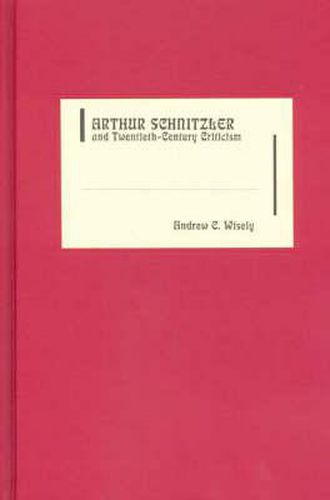Readings Newsletter
Become a Readings Member to make your shopping experience even easier.
Sign in or sign up for free!
You’re not far away from qualifying for FREE standard shipping within Australia
You’ve qualified for FREE standard shipping within Australia
The cart is loading…






Schnitzler, one of the most prolific Austrian writers of the 20th century, ruthlessly dissected his society’s erotic posturing and phobias about sex and death. His most penetrating analyses include Lieutenant Gustl, the first stream-of-consciousness novella in German; Reigen, a devastating cycle of one-acts mapping the social limits of a sexual daisy-chain; and Der Weg ins Freie, a novel that combines a love story with a discussion of the roadblocks facing Austria’s Jews. Today, his popularity is reflected by new editions and translations and by adaptations for theater, television, and film by artists such as Tom Stoppard and Stanley Kubrick. This book examinesSchnitzler reception up to 2000, beginning with the journalistic reception of the early plays. Before being suspended by a decade of Nazism, criticism in the 1920s and 30s emphasized Schnitzler’s determinism and decadence. Not until the early 60s was humanist scholarship able to challenge this verdict by pointing out Schnitzler’s ethical indictment of impressionism in the late novellas. During the same period, Schnitzler, whom Freud considered his literary Doppelganger, was often subjected to Freudian psychoanalytical criticism; but by the 80s, scholarship was citing his own thoroughgoing objections to such categories. Since the 70s, Schnitzler’s remonstrance toward the Austrian establishment has been examined by social historians and feminist critics alike, and the recently completed ten-volume edition of Schnitzler’s diary has met with vibrant interest.Andrew C. Wisely is associate professor of German at Baylor University.
$9.00 standard shipping within Australia
FREE standard shipping within Australia for orders over $100.00
Express & International shipping calculated at checkout
Schnitzler, one of the most prolific Austrian writers of the 20th century, ruthlessly dissected his society’s erotic posturing and phobias about sex and death. His most penetrating analyses include Lieutenant Gustl, the first stream-of-consciousness novella in German; Reigen, a devastating cycle of one-acts mapping the social limits of a sexual daisy-chain; and Der Weg ins Freie, a novel that combines a love story with a discussion of the roadblocks facing Austria’s Jews. Today, his popularity is reflected by new editions and translations and by adaptations for theater, television, and film by artists such as Tom Stoppard and Stanley Kubrick. This book examinesSchnitzler reception up to 2000, beginning with the journalistic reception of the early plays. Before being suspended by a decade of Nazism, criticism in the 1920s and 30s emphasized Schnitzler’s determinism and decadence. Not until the early 60s was humanist scholarship able to challenge this verdict by pointing out Schnitzler’s ethical indictment of impressionism in the late novellas. During the same period, Schnitzler, whom Freud considered his literary Doppelganger, was often subjected to Freudian psychoanalytical criticism; but by the 80s, scholarship was citing his own thoroughgoing objections to such categories. Since the 70s, Schnitzler’s remonstrance toward the Austrian establishment has been examined by social historians and feminist critics alike, and the recently completed ten-volume edition of Schnitzler’s diary has met with vibrant interest.Andrew C. Wisely is associate professor of German at Baylor University.